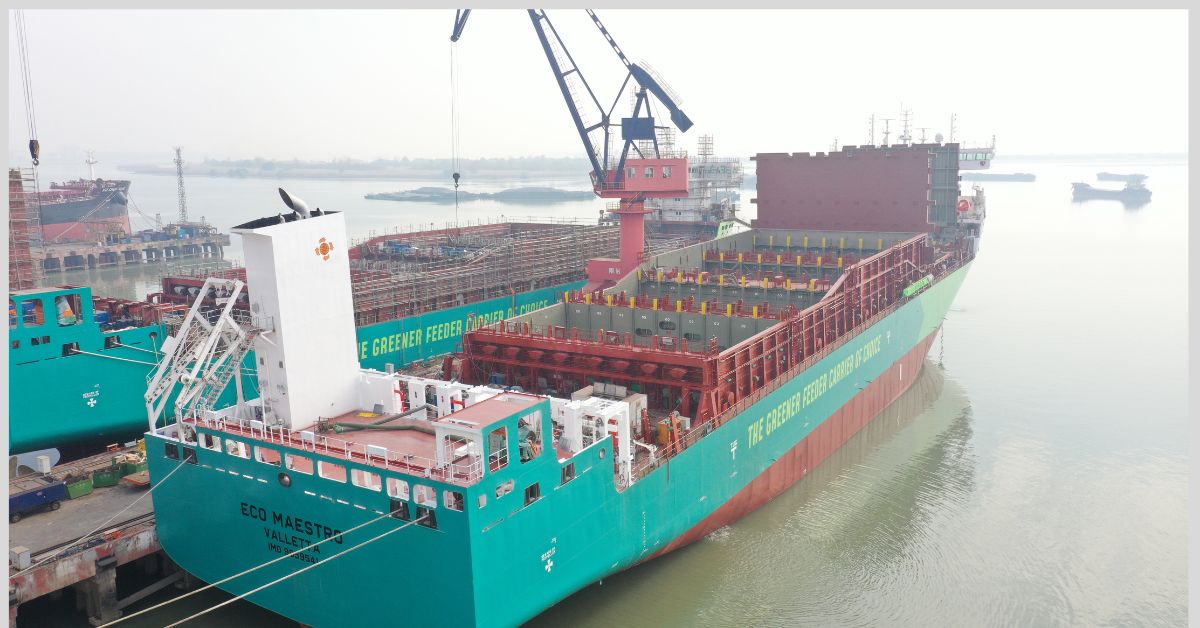X-Press Feeders, the world’s largest independent common carrier, plans to lead the global maritime industry by using dual-fuel vessels, powered by green methanol, to create ‘green routes’ early next year to the Scandinavia-Baltic region of northern Europe.
The maritime shipping company, which operates a fleet of more than 100 vessels, has 14 dual-fuel vessels on order and due for delivery from next year’s first quarter through to mid-2026. X-Press Feeders’ 14 dual-fuel ships are each at 1,200 TEU capacity with length overall (LOA) of 148 metres.
The first dual-fuel vessel, Eco Maestro, will have its maiden voyage in Q1 next year, and it will be from Shanghai – where the ship is built – to the Port of Rotterdam via the Suez Canal.
Eco Maestro, which is the first bio methanol powered ship to be built in China, will use bio-methanol for her voyage to Europe. Bio-methanol is a renewable energy source produced from the decomposition of organic matter, such as waste and residues. Because bio methanol is produced from a renewable source, it is often referred to as green methanol.
While X-Press Feeders is committed to using green methanol, the availability and distribution of methanol at ports on a global scale still poses a challenge.
“We aim to power Eco Maestro with green methanol for the entire journey from Shanghai to Rotterdam but certain ports enroute have no infrastructure at present to supply methanol to ships, so we are engaging them to make it possible,” says Francis Goh, X-Press Feeders’ Chief Operating Officer.
“We see this maiden voyage as a way to promote sustainable shipping globally and highlight to the global community how the shipping industry is working to play its part in helping to reduce CO2e emissions.”
“By embarking on this voyage, we are also highlighting to all industry stakeholders – not just shipping companies but also regulators, port operators, fuel suppliers, logistics companies, freight-forwarders and beneficial cargo owners (BCOs) – that we all need to work together and play our part to make sustainable shipping a reality.”
“Only by working together – step by step – can the industry put in place the necessary infrastructure at ports to support sustainable shipping. And only by having the end customer – namely the BCOs – on board, can we make sustainable shipping financially viable.”
“We are working with our industry partners and customers to put their goods on Eco Maestro and join us on the journey to more sustainable shipping,” he adds.
After her inaugural voyage from Shanghai to Rotterdam, Eco Maestro will be operating on a feeder network in Northern Europe, based in the Port of Rotterdam. The green routes will start in next year’s second quarter and be from Rotterdam to ports in Scandinavia and the Baltic states. X-Press Feeders will be the world’s first dedicated feeder carrier to operate a container vessel powered by green methanol. It has already signed a firm contract with Dutch fuel supplier OCI Global for the supply of green methanol at the Port of Rotterdam starting from 2024. OCI’s green methanol is ISCC (International Sustainability and Carbon Certification) certified.
“X-Press Feeders is most ideally suited to lead the maritime feeder sector in the adoption of green methanol, because we operate smaller, more fuel-efficient vessels on short-sea routes,” says Goh.
“A key challenge with using green methanol, or any sustainable fuel for that matter, is it is in relatively small supply. Production of green methanol and other sustainable fuels needs to scale up enormously to meet the needs of the global maritime industry,” he says.
“But as a feeder operator, where our ships tend to operate on short sea routes within a relatively small geography, the quantities of bio-methanol available are sufficient for our dual-fuel vessels to run ‘closed loop’ services, where about 95% of the entire round voyage can be powered by methanol, with a resupply of fuel at the bunkering port after every voyage.” he adds.
The benefit of using green methanol is that it greatly reduces CO2e emissions. Eco Mastro deployed on a round voyage service, would save 268kg of CO2e emissions for every TEU carried, when compared to a feeder vessel of similar capacity running on conventional marine fuel. (A TEU is a twenty-foot equivalent unit and is a standard-size shipping container).
The decision to add dual-fuel vessels powered by green methanol is a key element of the company’s pledge to reduce its greenhouse gas emissions (CO2e) by 20% by 2035, 50% by 2040 and be net zero by 2050.
“We understand that there is no single solution to reducing the maritime industry’s greenhouse gas emissions. To achieve our longtime goals, we need to start taking steps today and this involves implementing several initiatives to reduce greenhouse gas emissions,” adds Goh.
For more information on X-Press Feeders’ sustainability pledge and initiatives, go to:







